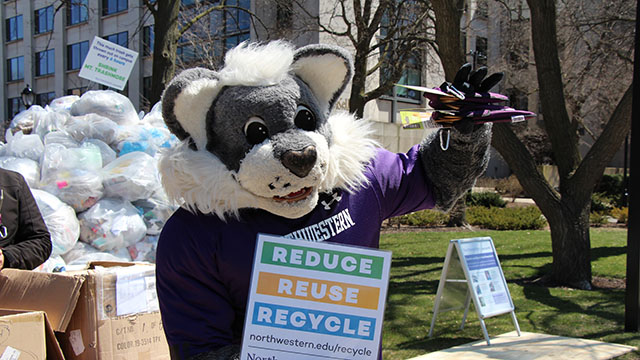Northwestern University has launched its first Integrated Solid Waste Management Plan (ISWMP) aimed at reducing waste and protecting the environment by taking a greener approach to waste management.
This Plan supports the University’s Strategic Sustainability Plan, which establishes objectives for cutting greenhouse gas emissions, reducing waste and fostering environmental and ethical stewardship. The ISWMP identifies strategies for meeting the University’s objective of diverting 50 percent of campus waste from landfills by 2020 and further outlines waste reduction opportunities.
The Plan will guide the University’s efforts to achieve its Resource Conservation program vision within Northwestern’s Strategic Sustainability Plan “to adopt sustainable procurement practices for materials, food and services and take a comprehensive approach to conserving resources and reducing and managing waste.”
The ISWMP provides Northwestern’s schools and departments the opportunity to support increased diversion and reduced costs.
The results of a 2017 waste audit, with input received from students, faculty and staff, informed the Plan, targeting reasonable strategies for waste reduction and diversion. The waste audit consisted of more than 9,000 pounds of trash sorted from 20 buildings across the Evanston and Chicago campuses into 21 categories.
“By learning specifically what is in our waste stream, we now have the information needed to improve education, inform waste reduction and reuse efforts and expand recycling opportunities,” said Julie Cahillane, Northwestern sustainability associate director.
The audit team used an activity zone approach to capture waste from buildings by use, such as administrative offices, student housing and multi-activity spaces. A study team and a group of volunteers from throughout the University sorted the waste. The Plan breaks down campus waste to show what is avoidable, currently recyclable, compostable, potentially recyclable and nonrecoverable. The data revealed that Northwestern could recycle, avoid or compost nearly 70 percent of waste generated on campus.
In addition to the waste audit, the study team gathered input from more than 80 participants through focus groups, one-on-one interviews and workshops conducted throughout the study period. Discussions shed light on the overall campus culture surrounding resource recovery, waste-related priorities and challenges. The feedback was used to develop actions for increased recycling and waste reduction.
Over the past 22 months, Northwestern partnered with the Illinois Sustainable Technology Center (ISTC) to conduct the audit, engage stakeholders and develop a plan that would address the campus waste characterization and our stakeholder concerns.
“ISTC brought a wealth of knowledge to this process,” Cahillane said. “Their attention to the specifics of our campus and community were critical to the success of this effort. Working with them was a great experience.”
“ISTC is honored to have been part of an integrated solid waste plan that prioritizes resource conservation by utilizing data, understanding local realities and building on institutional successes to realize goals,” said Shantanu Pai, assistant sustainability researcher.
To help reach Northwestern’s goal of 50 percent diversion by 2020, learn what can be recycled on campus, participate in waste reduction efforts and understand your individual impact.


